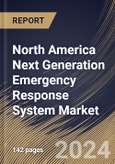The US market dominated the North America Next Generation Emergency Response System Market by Country in 2022, and would continue to be a dominant market till 2030; thereby, achieving a market value of $904.7 million by 2030. The Canada market is experiencing a CAGR of 8% during (2023 - 2030). Additionally, The Mexico market would exhibit a CAGR of 7.1% during (2023 - 2030).
Next generation emergency response systems utilize advanced technologies such as drones, robotics, and GIS (Geographic Information Systems) to support search and rescue operations in hazardous or hard-to-reach environments. These systems provide aerial surveillance, mapping, and reconnaissance capabilities, assisting responders in locating and rescuing survivors more efficiently. Next-generation emergency response systems enhance patient care and resource management in emergency medical services. These systems enable emergency medical services (EMS) providers to track patient data, manage medical supplies, and communicate with hospitals and other healthcare facilities in real-time, improving the coordination and efficiency of emergency medical response efforts.
Additionally, with disasters becoming more frequent and severe due to climate change and urbanization, there is a growing recognition of the need for more advanced emergency preparedness and response systems. This included the development of earthquake-resistant buildings, the introduction of emergency drills, and the creation of the "Disaster Control Law" to coordinate disaster response efforts. Due to frequent disasters, the implementation of the next-generation emergency response system is rising within the infrastructure.
The expansion of the healthcare sector in Canada drives the adoption of new generation emergency response system solutions that enhance emergency preparedness, response, and patient care within healthcare facilities, contributing to improved outcomes for patients and healthcare providers. In conclusion, the increasing health care sector in the region is propelling the market’s growth.
Based on Offering, the market is segmented into Hardware, Software, and Services. Based on Hardware Type, the market is segmented into Switching & Routing Equipment, Call Handling Systems, Network Infrastructure Equipment, and Others. Based on Software Type, the market is segmented into Call Management Software, Location-Based Services Software, Text Messaging Software, Multimedia Support Software, and Others. Based on Services Type, the market is segmented into Professional Services, and Managed Services. Based on End User, the market is segmented into Public Safety Answering Points (PSAPs), Law Enforcement Agencies, Fire Departments, Emergency Medical Services, and Others. Based on countries, the market is segmented into U.S., Mexico, Canada, and Rest of North America.
List of Key Companies Profiled
- Cisco Systems, Inc.
- Atos Group
- Motorola Solutions, Inc.
- AT&T, Inc.
- Carbyne Ltd.
- Hexagon AB
- Everbridge, Inc.
- Esri, Inc.
- Avaya, Inc. (Avaya Holdings Corp.)
- Sinch AB
Market Report Segmentation
ByOffering
- Hardware
- Switching & Routing Equipment
- Call Handling Systems
- Network Infrastructure Equipment
- Others
- Software
- Call Management Software
- Location-Based Services Software
- Text Messaging Software
- Multimedia Support Software
- Others
- Services
- Professional Services
- Managed Services
- Public Safety Answering Points (PSAPs)
- Law Enforcement Agencies
- Fire Departments
- Emergency Medical Services
- Others
- US
- Canada
- Mexico
- Rest of North America
Table of Contents
Companies Mentioned
- Cisco Systems, Inc.
- Atos Group
- Motorola Solutions, Inc.
- AT&T, Inc.
- Carbyne Ltd.
- Hexagon AB
- Everbridge, Inc.
- Esri, Inc.
- Avaya, Inc. (Avaya Holdings Corp.)
- Sinch AB









